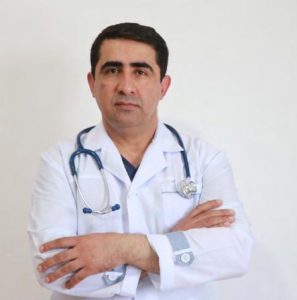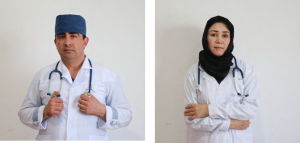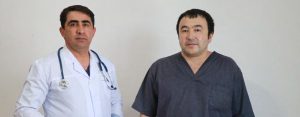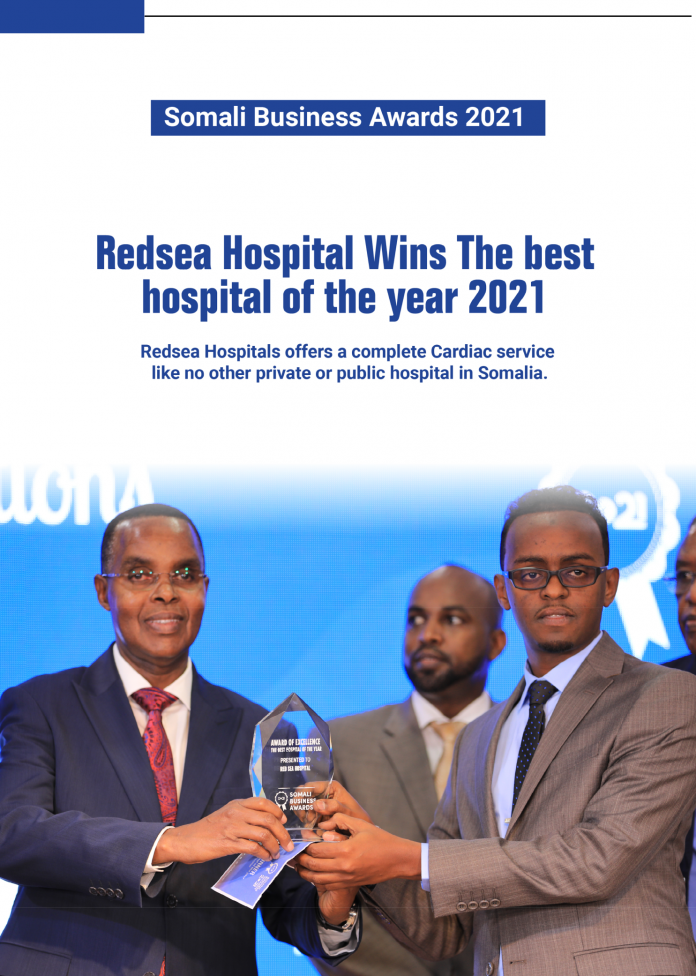Redsea Hospitals offers a complete Cardiac service like no other private or public hospital in Somalia.
About Us
Your Health is Our Primary Concern. We serve our communities by providing exceptional care, as we prevent illness, restore health and provide comfort to all who entrust us
with their care. Redsea will continue to invest in healthcare facilities, the latest available technology, a comprehensive range of capabilities that enables our specialists in the various
departments to provide their patients with cutting-edge and life-saving treatments – many of which are firsts in Somalia.
Our Vision
- Combining Quality Care & Modern Conveniences. We started One Medical Hospital with the belief that clinical excellence commitment to service and a modern approach make for a truly great experience. To bring our vision to life, we listened to our patients thoughtfully applied technology, and hired the best doctors to create a practice that is designed specifically to meet your needs.
- World-Class Care
Rigorously selected board certified doctors and longer appointments with doctors who
actually listen. - Putting You First
Same-day appointments, convenient office locations, and on-site lab test with no appointment required. - Everywhere Access
Book appointments and get 24/7 care via phone, app, or online, and email directly with your doctor. - Attention to Service
95% of appointments start on time or early, and we’re in network with most PPO and HMO plans.

Our Services
Cardiology
Redsea Hospitals offers a complete Cardiac service like no other private or public hospital in Somalia. We offer everything from diagnostics and minimally invasive procedures to complex open-heart surgery and everything in between. We offer cardiac care for both
adults and children. Our Rapid Access Cardiology Clinic (RACC) offers urgent appointments
for patients with concerns about their heart. Patients can book an appointment for a heart check via GP referral, or self-referral.
Our Congenital Heart Clinic offers continued care for patients suffering from congenital heart conditions who find themselves requiring continuous access to care after they
have left the pediatric system. Our team of Consultant Cardiologists, Cardiothoracic
Surgeons, Cardiac Physiologists and technicians work as a team in providing you unparalleled care in modern and technologically advanced surroundings.
Our available technologies are PCI or Angiography, Echo, ECG, Stress Test ECG, Holter ECG, with Open-Heart Surgery in process.
Peripheral Vascular Surgery
Minimally invasive treatment to open narrow veins. Multiple venous conditions such as deep vein thrombosis and chronic venous insufficiency and MayThurner syndrome can cause veins in the legs, chest, or abdomen to narrow or become blocked. Your doctor may recommend placement of a wire mesh tube called a stent to open the vein and allow blood to flow more easily.
The doctors in our vein program are experts at treating venous disorders using advanced minimally invasive methods. They will work with you to develop a treatment plan for your
unique condition to help relieve symptoms and minimize the risk of complications. Our surgeons are supported by specially trained physician assistants, nurses, nurse practitioners, surgical technicians, anesthesiologists, and other support staff. State-of-the-art diagnostic and surgical technology and tools help ensure that patients receive high-quality care in a safe environment—and the best possible outcomes.
General Surgery
General Surgery focuses on procedures including the esophagus, stomach, small bowel, colon, liver, pancreas, gallbladder and bile ducts, hemorrhoids, anal fissure, cancer surgery, skin graft, and often the thyroid gland. General Surgeons also deal with diseases involving the skin, breast, soft tissue, and hernias. Whenever possible, we offer a minimally invasive approach, which means less discomfort as well as faster recovery times.
Redsea Hospital offers surgical services at the heart of Mogadishu. Inpatient and outpatient surgery are performed at the Hospital.
Our Surgeon
Our surgeon are supported by specially trained physician assistants, nurses, nurse practitioners, surgical technicians, anesthesiologists, and other support staff. State-of-the-art diagnostic and surgical technology and tools help ensure that patients receive high-quality care in a safe environment—and the best possible outcomes.
Internal Medicine
Redsea Hospital’s Internal Medicine Department treats a large range of illnesses and disorders including those related to; respiratory issues such as breathlessness, lung diseases, asthma and COPD, gastroenterology, liver issues, renal (kidney) problems, infectious diseases, and rheumatology amongst others. Our specialist consultants have an abundance of experience and are backed by the full services of Redsea Hospitals.
Primary healthcare services rendered by internists encompass patients of all ages with all kinds of acute and chronic physical, mental, and social health problems, including multiple chronic diseases, in the broadest sense. In conclusion, when compared to the physicians
of other medical disciplines, an internist should have broad knowledge covering many medical fields.
Diagnosis
If you have been referred by your GP to a Consultant in General Internal Medicine, the diagnostics carried out will depend on the reason you have been referred. Patients may have diagnostic tests carried out in our radiology department. This department has the most technologically advanced equipment in all of Ireland.
Blood tests, swabs or biopsies taken will be sent to our in-house state-of-the-art laboratory for testing. Our Endoscopy Department will perform any endoscopies required for diagnostic purposes.
Emergency Department
Redsea Hospital’s ED is a consultant-led Department. Our team of experts are on hand to offer immediate access to medical assessment and treatment. Our Consultants in Emergency Medicine and their team treat an array of conditions and injuries from sprains, breaks and cardiac complaints to acute medical and surgical emergencies.Backed by our full-service hospital with over 5 Consultants and 30 healthcare professionals.
OBS & Gynecology
We offer a full range of women’s health and wellness services including obstetrics, gynecology, breast and cervical health, mammography, managing menopause, preconception counseling and infertility. Our services include care during your pregnancy, promoting the benefits of breastfeeding, well-woman care as well as the diagnosis, treatment and surgical care for gynecological problems.
We provide early prenatal care, which is the first and best step to increase your chances for a healthy outcome for you and your baby. We also have a Maternal Oral Health Initiative Program.
Personalized Care for Your Pregnancy
Pregnancy is a life-changing experience that’s different for every woman. And Redsea Hospital takes your maternity needs personally. From prenatal testing to lactation services, you and your newborn can expect the highest level of attention and care from our dedicated team. Having Your Baby at Redsea Hospital, whether your pregnancy is
routine or complicated, Redsea Hospital supports you at every stage of the childbirth journey, from prenatal healthcare through labor, delivery, and caring for your newborn.
Not only do we look after our patients, expectant mothers and their newborns clinically,
but we also care for their and their families’ comfort and emotional well-being. Our facilities are therefore designed to offer a warm and comfortable environment with modern amenities, and our providers engage patients with their care at all levels to ensure they are fully informed and aware of their needs.
Patient and Family focused Care
We understand that each patient has personal and unique concerns. This is why we encourage our patients, and those close to them, to be active participants in care, and we work with each family to meet their needs. Through each step, we clearly explain every aspect of care – discussing all appropriate options to help the patient and their family make the best decisions.
E.N.T.
Complete Care for Ear, Nose and Throat.
We offer comprehensive treatment and care for all kinds of ENT ailments.Our Specialist will provide medicinal as well as surgical solutions to problems ranging from hearing loss and sleeping disorders to sinusitis, vertigo and voice impairments. ENT problems can cause
irritating symptoms that range from a runny nose, sneezing, fever, sore throat and coughs
to severe complications such as hearing loss, and meningitis.
Some of the common ENT problems are throat infection, laryngitis, sinusitis, hearing impairment, nasal bleeding, vertigo, change of voice and ringing noise in the ears. ENT physicians are doctors who specialise in medical and surgical management and treatment of patients with problems of the ear, nose, throat, and related structures of the head and neck.
Heart Attack and Emergency Response
Most heart attacks are caused by clots that form in the coronary arteries, the arteries that carry blood and oxygen to the heart muscle. “Clothes usually form in narrowed coronary arteries. Atherosclerotic plaque inside the artery wall sometimes cracks, triggering clot formation. Clots in the coronary arteries prevent the flow of blood and oxygen to the heart muscle, which causes the death of the heart cells in that area. Heart attack is a potentially fatal condition that requires immediate intervention.
One out of every five sudden deaths occurs due to a heart attack. Early diagnosis is very important in a heart attack. The loss of time for intervention not only increases the amount of heart muscle that is destroyed, but also increases the likelihood of death. “There is no compensation for the heart muscle that has been destroyed. As the only hospital has cardiac catheterisation laboratory in Mogadishu, about 80% of the patients who applied to us or were referred to us due to a heart attack in Mogadishu are late.
Preventing patients from dying from a heart attack depends on reaching a hospital with an interventional cardiology department as soon as possible from the first moment of
the event. It is wrong even to expect blood results in types of heart attacks that need urgent intervention. If possible, the patient’s occluded vessel should be tried to be opened
urgently by percutaneous coronary intervention.
What is percutaneous coronary intervention?
Arteries that bring clean blood to the heart muscle run on the outer surface of the heart and are called “coronary arteries”. Due to atherosclerosis disease, narrowing and occlusions may develop in the coronary arteries. This condition is called coronary artery disease in medical language. While narrowing of the arteries can simply cause chest pain, sudden blockages can lead to a heart attack. Here, the process of opening the narrowing and occlusions of the coronary arteries by entering the artery without surgery is called “percutaneous coronary intervention”.
Percutaneous coronary intervention can be performed by dilating the stenotic vessel with a balloon and placing a metal skeleton called a stent.
How is a percutaneous coronary intervention performed?
Percutaneous coronary intervention is initiated by entering a peripheral artery with a local anesthetic with a needle. After entering the artery with a needle, a thin sheath is placed in the artery to facilitate and maintain the procedure.

Through it, again with the help of very thin tubes (2-3 mm thick), the mouths of the vessels feeding the heart come out of the aorta. A contrast agent that can be seen with x-rays is injected into the artery through these thin tubes and the artery is visualized (angiography). Thus, the location, degree and length of the stenosis or obstruction are determined. After that, the stenosis or occlusion is passed over the very thin special wires by sliding the balloon or the stent loaded by compression on the balloon.
When it comes to the stenosis area (by direct visualization with fluoroscopy), the stent balloon is inflated and the stent is placed on the vessel wall in that area with high pressure. Thus, the closed artery is opened.
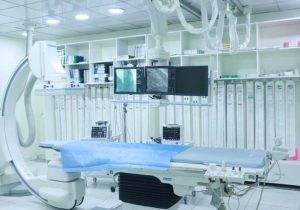
The Biggest Symptom is chest pain
Among the symptoms of a heart attack, “The biggest symptom is chest pain. When cardiac arrest occurs, it is necessary to immediately take him to the intensive care unit and intervene immediately. If chest pain is due to a heart attack, the blocked coronary artery should be intervened in a center that can perform angiography. There is currently no such network in Mogadishu. The patient needs to be processed quickly. So angiography should be done.
Thus, the condition of the heart vessels is detected, then the stent opens the blockage and the heart muscle is fed again.
Hypertension and diabetes are the most important risk factors
It is also useful to have information about the risk factors of coronary artery diseases and heart attack. These risk factors can be listed as age, male gender, hypertension, hypercholesterolemia, diabetes, smoking and family history of coronary heart disease at an early age.

The Biggest Symptom is chest pain
Among the symptoms of a heart attack, “The biggest symptom is chest pain. When cardiac arrest occurs, it is necessary to immediately take him to the intensive care unit and intervene immediately. If chest pain is due to a heart attack, the blocked coronary artery should be intervened in a center that can perform angiography. There is currently
no such network in Mogadishu.
The patient needs to be processed quickly. So angiography should be done. Thus, the condition of the heart vessels is detected, then the stent opens the blockage and the heart muscle is fed again. Hypertension and diabetes are the most important risk factors.It is also useful to have information about the risk factors of coronary artery diseases and heart attack. These risk factors can be listed as age, male gender, hypertension,hypercholesterolemia, diabetes, smoking and familyhistory of coronary heart disease at an early age.
Pay attention to chest pain and changes in EKG
Three important findings are used in the diagnosis of heart attack in the emergency unit. “The first is the patient’s complaint, which is mainly caused by chest pain. Secondly, ECG (Electrocardiogram) and thirdly, by measuring the level of some enzymes (especially Troponin I) that mix with the blood, the diagnosis is made definitively.
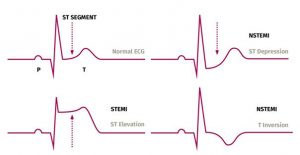
Painless heart attack is more dangerous
Chest pain can appear in different ways. “Chest pain behind the breastbone is the most important symptom of a heart attack. In heart attack, which is also defined as a silent heart attack, this pain may be very vague or not felt at all, especially in diabetics and the elderly. Chest pain often radiates from the chest to the shoulder or arms,neck, teeth, jaw, abdomen, or back.
Sometimes the pain is felt only in one of these areas. Whether a heart attack is painless or painful has no bearing on its severity. Even in painless patients, it may be more dangerous because the patient may not be aware of the disease. In addition to chest pain, other symptoms as symptoms of heart attack can be listed as: “shortness of breath, cough, dizziness and lightheadedness, fainting, nausea and vomiting, feeling of “fear of death” and distress.”
Heart attack is an emergency. It requires hospitalization and intensive care. Because fatal rhythm disorders (arrhythmias) are the main cause of death in the first few hours of a heart attack. The goals of treatment are to stop the progression of a heart attack, keep heart damage to a minimum, reduce the demands of the heart so it can heal, and prevent complications. It is not possible to revive the heart muscle that has lost
its vitality.
It should be underlined that early diagnosis is very important in heart attack. “As time passes, the probability of death from rhythm disorders will increase and the amount of necrotic heart muscle will increase. There is no compensation for the devastated heart muscle. In a heart attack, “TIME = HEART MUSCLE”.
Pay attention to these recommendations to prevent a heart attack!
Interventional CardiologySpecialist Dr.Mustafa Oğuz Varol gave the following recommendations to patients to prevent recurrence of heart attack and to protect against
heart attack.
1) “Check your blood pressure. If necessary, use the drugs that your doctor will recommend. Check your cholesterol levels. If necessary, use the drugs that your doctor will recommend.
2) If you smoke, stop smoking.
3) If you have diabetes, keep it under control. If necessary,use the drugs that your doctor
will recommend.
4) Follow a diet rich in fruits and vegetables and low in animal fat.
5)If you are overweight, lose weight.
6) To protect your heart health, exercise your body by walking or other exercises 4-5 days a week, but consult your heart disease specialist first.
7) Stay away from stress, get professional help if necessary.
8) If you have one or more risk factors for a heart attack, talk to your doctor about whether you should take aspirin to help prevent a heart attack. Do not forget that unconscious use of aspirin can have negative consequences such as stomach bleeding.
Dr Mustafa Oğuz Varol
Interventional Cardiologist
Red Sea Hospital
We also provide Covid-19 Tests & Travel Certifications.
Our Doctors
1.Dr.Mustafa Oguz | Interventional Cardiologist.
2.Dr.Naji Mounef | Interventional Cardiologist
3.Dr.Ziad Shahin | General Surgeon
4.Dr.Mustaf Muxudin | General Pysician
5. Nasibzhon abdizhamilov | E.N.T Specialist
6.Dr.Nigina Qurbonova | Obs/Gyn Specialist
7.Dr.Khoshim Azizov |Pediatrician and Anesthesiologist
